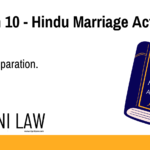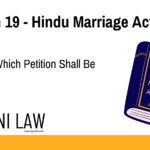Code: Section 12 – Hindu Marriage Act, 1955
Section 12 of the Hindu Marriage Act, 1955 reads:
“(1) Any marriage solemnized, whether before or after the commencement of this Act, shall be voidable and may be annulled by a decree of nullity on any of the following grounds:—
(a) that the marriage has not been consummated owing to the impotence of the respondent; or
(b) that the marriage is in contravention of the condition specified in clause (ii) of section 5; or
(c) that the consent of the petitioner was obtained by force or by fraud as to the nature of the ceremony or as to any material fact or circumstance concerning the respondent; or
(d) that the respondent was at the time of the marriage pregnant by some person other than the petitioner.
(2) Notwithstanding anything contained in sub-section (1), no petition for annulling a marriage—
(a) on the ground specified in clause (c) shall be entertained if—
(i) the petition is presented more than one year after the force had ceased to operate or, as the case may be, the fraud had been discovered; or
(ii) the petitioner has, with his or her full consent, lived with the other party to the marriage as husband or wife after the force ceased to operate or the fraud was discovered;
(b) on the ground specified in clause (d) shall be entertained unless the court is satisfied—
(i) that the petitioner was at the time of the marriage ignorant of the facts alleged;
(ii) that the proceedings have been instituted within one year of the date of the marriage; and
(iii) that marital intercourse with the consent of the petitioner has not taken place since the discovery by the petitioner of the fact alleged.”
Related: Section 5 – Hindu Marriage Act: Conditions for a Valid Marriage
—
Explanation of Section 12 – Voidable Marriages
Section 12 of the Hindu Marriage Act outlines the legal framework for voidable marriages — marriages that are valid unless and until annulled by a court. Unlike void marriages, voidable marriages are considered legal until a decree of nullity is granted by the court on specific grounds.
Grounds for voidability include:
- Impotence of the respondent, preventing consummation of marriage
- Mental incapacity at the time of marriage as per clause (ii) of Section 5
- Consent obtained by force or fraud
- Respondent’s pregnancy by another person at the time of marriage
Section 12 also sets out limitations and procedural requirements. For example, the petitioner must act within specific time limits and not have voluntarily cohabited after discovering the fraud or other defect.
—
Illustration
Example 1: Marriage Not Consummated Due to Impotence
A woman marries a man but later discovers he is impotent and the marriage has not been consummated. She may approach the court under Section 12(1)(a) for annulment.
Example 2: Consent Obtained by Fraud
A person marries someone who lied about their identity or concealed a significant fact. If the fraud is discovered and the petitioner acts within one year, the marriage can be annulled.
Example 3: Pregnancy by Another
A man discovers after marriage that his wife was pregnant by another man at the time of marriage. If he was unaware and files the petition within one year, and no marital intercourse occurred after the discovery, he may obtain a decree of nullity.
—
Common Questions and Answers on Section 12
- What is a voidable marriage under the Hindu Marriage Act?
A voidable marriage is a legally valid marriage that may be annulled through a court decree based on specific statutory grounds. - How is a voidable marriage different from a void marriage?
Void marriages are invalid from the beginning. Voidable marriages are valid until annulled by the court. - Can both spouses file for annulment?
Yes, the affected spouse can file a petition for annulment if they meet the required conditions. - What is the time limit to file a petition under Section 12?
It varies by ground:
- For fraud or force: within one year of discovery
- For pregnancy by another: within one year of marriage and before marital intercourse takes place
- Are children from a voidable marriage legitimate?
Yes. Children born before the annulment of a voidable marriage are treated as legitimate under Section 16 of the Act.
—
Conclusion
Section 12 of the Hindu Marriage Act provides crucial protection to individuals who have entered into a marriage under duress, fraud, or misrepresentation. While such marriages are legally valid until annulled, they offer the affected party the right to seek a decree of nullity from the court. It is essential for individuals to act promptly and within legal time frames to assert their rights under this provision.
For detailed legal help on annulment, marriage validity, and other family law issues, visit ApniLaw.








